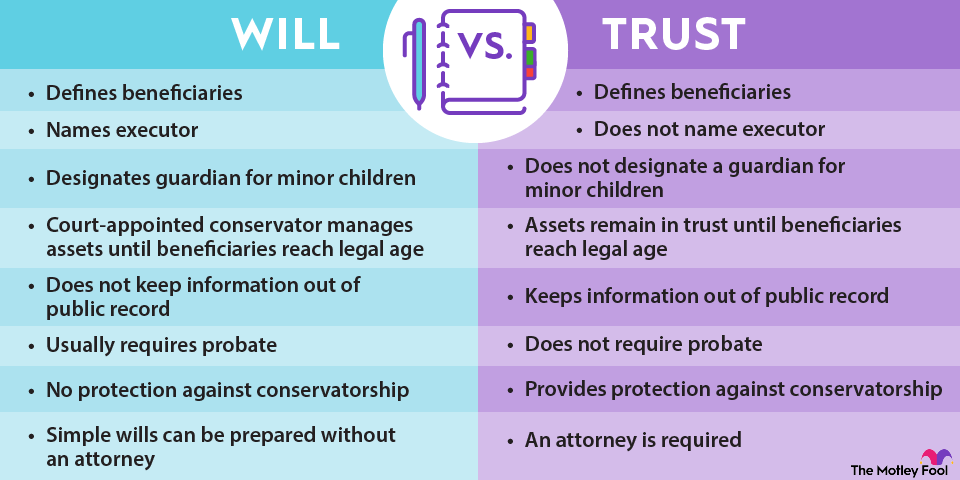Deciding between a revocable and an irrevocable trust can be one of the more difficult financial decisions you’ll make. Both have their benefits and drawbacks, and both can ensure that your property is disposed of as you choose, but they have several crucial differences.

What is a revocable trust?
A revocable trust, also known as a living trust, is an estate planning tool that defines how assets will be distributed to beneficiaries. The owner generally retains control and can change it as they see fit at any time.
This type of trust can work well if you've not quite settled on the property you’ll own for the rest of your life or the number of children you'll have. However, the level of control you retain over a revocable trust also means assets in the trust are at risk of lawsuits from creditors and remain subject to estate taxes.
What is an irrevocable trust?
An irrevocable trust is a legal agreement where the grantor (the original owner) permanently transfers assets into the trust. As with a revocable trust, the owner can specify how the assets will be divided, when, and under what conditions.
Unlike a revocable trust, an irrevocable trust is almost impossible to change. Because you no longer have any day-to-day control over the assets in the trust, they’re generally protected from creditors and estate taxes.
Revocable vs. irrevocable trusts: Key differences
Although both are important for retirement planning, revocable and irrevocable trusts function much differently. Here are their primary differences:
- You can change a revocable trust at any time. You can't change an irrevocable trust unless everyone involved agrees.
- An independent trustee, and sometimes an optional trust protector, manages an irrevocable trust. Revocable trusts are often self-administered, meaning they're managed by the person who owns the trust.
- Irrevocable trusts protect assets against litigation, as well as most estate taxes. Revocable trusts don't shield assets from lawsuits, collections, or estate taxes.
- Irrevocable trusts require a separate tax return and a different tax calculation for the assets they hold.
Revocable vs. irrevocable trusts: Examples
Let's say you want to pass a substantial family home with land to your children upon your death. Here are simple examples of how this would work with a revocable trust and an irrevocable trust.
Revocable trust example
If you establish a revocable trust containing the house and the property surrounding it, you would be able to add or subtract items from that trust until you were no longer capable of making those decisions for yourself. You could also add or subtract people from the trust; for example, you could add your grandchildren as they’re born, or a favorite nephew.
Here are the potential downsides you could face with a revocable trust:
- The trust wouldn't protect your property from creditors. For example, if you accumulate substantial medical bills that you can't pay, the hospital could potentially go after your estate, including the revocable trust, to collect what it's owed.
- You'd pay taxes on all property as if it were not in a trust, since you still have control of it.
- Assets in the trust count against you if you need access to government benefits as you age. Medicaid and Supplemental Security Income both generally require you to deplete your assets before you can qualify, and a revocable trust is still considered an asset, even if the intent is to leave it to a family member.
- The home and property in the revocable trust will be subject to estate taxes if they exceed the filing threshold. The filing threshold for estate taxes is $13.99 million in 2025 and $15 million in 2026.
Irrevocable trust example
If you chose an irrevocable trust, you'd need to ensure that the beneficiaries you include are exactly the people you want to inherit the property. The trust is a static object, and you can't go back to change it later.
The irrevocable trust protects the property against creditors and lawsuits, as the trust is effectively sealed away in a legal vault. You can’t dispose of it at will, so it’s not a liquid asset that can be pursued.
You'll also no longer personally pay any income taxes on property locked in the trust if it generates income. Since the trust isn't included in your estate, it's not considered in estate tax calculations. Note that you still need to pay taxes on any income generated by assets in an irrevocable trust. It’s just separate from your regular taxes and reported on its own return.
If you need Medicaid or Supplemental Security income, your irrevocable trust isn’t considered an asset for those purposes. Although it will no longer be property that you can dispose of, you will be able to draw these benefits without risking your ability to pass the property on if your goal is to pass it along to your heirs.












